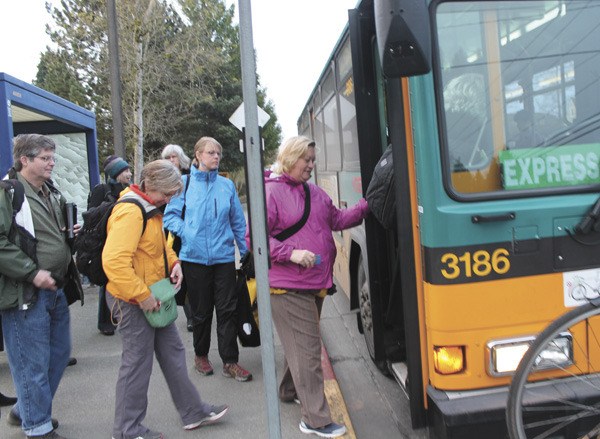Cuts to the county’s bus system, should it fail to secure new funding by next year, could hit Vashon hard, according to a scenario released by the county last week.
An illustration showing which bus routes could be affected should King County Metro cut 17 percent of its service next year has both of Vashon’s bus routes on the chopping block. Route 119, which runs between the north end ferry terminal and Dockton, is at risk of being completely eliminated, and 118, which runs between the north end and Tahlequah, could see reductions.
The scenario, which Metro forwarded to the Metropolitan King County Council on April 1 as part of its annual report, showed that the entire county could see significant cuts inservice due to falling tax revenue and the expiration of a temporary car-tab fee. Metro estimates that seven in 10 riders could be affected by the cuts, with 30 percent of Metro’s bus routes identified for possible elimination next fall, and another 40 percent of routes selected have some trips cancelled. The county would evaluate routes more closely and reach out to riders before any actual cuts are made.
“The risk is real,” said Victor Obeso, Metro’s manager of service development. “It’s not a proposal in that we are still taking a look at our most current data.”
Metro has faced budget shortfalls since 2008 due to declining sales tax revenue. The agency faced a similar funding crisis last spring, but was bailed out when the Metropolitan King County Council enacted a new $20 car-tab fee. That fee, however, is set to expire in June of 2014, leaving Metro with a $75 million annual budget hole. What’s more, the agency has raised fares four times in recent years , cut dozens of employees and used up most of its reserves to retain service. In the past year, it also eliminated some of the trips with the lowest ridership, including some on Vashon.
“We’re in a worse position,” Obeso said. “We’re basically affecting routes that carry more and more riders even though they’re still in the bottom 25 percent.”
Some of Vashon’s regular bus riders have expressed alarm at the possible reductions, saying they think the island’s bus service is already too infrequent.
“I don’t see how you can reduce the bus service even more on Vashon and fit all the people on the bus who want to ride the bus,” said Chris Townsend, who rides the 118 to his job in downtown Seattle each day.
Townsend’s bus is popular and likely wouldn’t be cut, he said, but he does worry that other eliminations might push more riders onto his bus, which is already packed by the time it gets to the ferry.
What’s worse, Townsend said, elimination of routes with lowest ridership could leave some of Vashon’s low-income residents on the streets.
“I personally pick up hitchhikers because of the poor bus service we have already,” he said. “A lot of people can’t afford cars.”
Islander Chris Greely was affected by Metro’s most recent round of cuts, when last spring the county cut 119’s last two trips of the evening to Dockton. Greely now drives to his job at a food importer in the International District — he can’t get off work soon enough to catch an earlier bus home. He worries his wife, who rides rides 118, could be affected by future cuts.
“She says her bus is standing-room only,” he said.
Chip Giller, who also commutes downtown on the 119, said he would be in the same situation as Greely should that route be totally eliminated. However, his family doesn’t have a spare car he could drive to the ferry or another bus stop.
“What Metro’s proposing would be devastating to us,” he said. “Our lives would be diminished, and we’d really have to question whether we’d stay on Vashon.”
Rep. Joe Fitzgibbon (D-Burien) said he was aware of how potential cuts could impact Vashon. He and other lawmakers, he said, are currently working to find solutions not only for King County Metro, but for the ferry system and state and county roads, all of which are facing deficits because of declining tax revenue.
Fotzgibbon, a member of the Joint Transportation Committee, said he hoped this was the year the Legislature could pass a comprehensive transportation package, enacting new taxes to fund highway projects, maintain rural roads and avoid cuts to ferry service. Such a package, he said, will hopefully include an option for King County to put a motor vehicle excise tax on the next ballot.
“That’s what we’re hoping for, a local option to pay for King County Metro,” he said.
In recent years, similar transportation packages have failed to gain traction in the Legislature. Fitzgibbon, however, said he was more hopeful this session, which is set to end this month or next.
At the same time, he added, lawmakers are placing a high priority on funding education, and House Republicans so far have not shown much support for new transportation taxes.
“I definitely think that we’re closer this year than we have been before, but there’s still not a very clear path for how it passes,” he said.
Should the county reduce bus service, initial reductions would begin this fall, with the most significant cuts coming in the fall of 2014.



